
The Battle of Jutland was a naval battle between Britain's Royal Navy Grand Fleet, under Admiral Sir John Jellicoe, and the Imperial German Navy's High Seas Fleet, under Vice-Admiral Reinhard Scheer, during World War I. The battle unfolded in extensive manoeuvring and three main engagements from 31 May to 1 June 1916, off the North Sea coast of Denmark's Jutland Peninsula. It was the largest naval battle and only full-scale clash of battleships of the war, and the outcome ensured that the Royal Navy denied the German surface fleet access to the North Sea and the Atlantic for the remainder of the war, as Germany avoided all fleet-to-fleet contact thereafter. Jutland was also the last major naval battle, in any war, fought primarily by battleships.

Assens is a town with a population of 6,061 on the west coast of the island of Funen on the eastern side of the Little Belt in central Denmark. By road, Assens is located 41.2 kilometres (25.6 mi) southwest of Odense, 34 kilometres (21 mi) northwest of Faaborg, and 33.34 kilometres (20.72 mi) southeast of Middelfart. Assens is the municipal seat of Assens Municipality in Region of Southern Denmark. It was the birthplace of sculptor Jens Adolf Jerichau who married the well-known portraitist Elisabeth Jerichau-Baumann; both artists' works are exhibited at the local art museum, Vestfyns Kunstmuseum.
North Jutland may refer to:
The name South Jutland can refer to various different areas of the peninsula of Jutland in Denmark:

The Grand Fleet was the main battlefleet of the Royal Navy during the First World War. It was established in August 1914 and disbanded in April 1919. Its main base was Scapa Flow in the Orkney Islands.
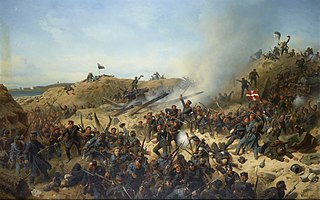
The Second Schleswig War, also sometimes known as the Dano-Prussian War or Prusso-Danish War, was the second military conflict over the Schleswig-Holstein Question of the nineteenth century. The war began on 1 February 1864, when Prussian and Austrian forces crossed the border into the Danish fief Schleswig. Denmark fought troops of the Kingdom of Prussia and the Austrian Empire representing the German Confederation.
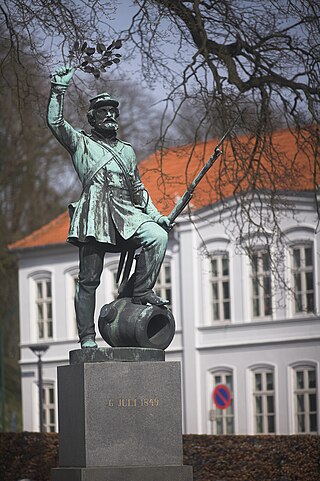
Fredericia is a town located in Fredericia Municipality in the southeastern part of the Jutland peninsula in Denmark. The city is part of the Triangle Region, which includes the neighbouring cities of Kolding and Vejle. It was founded in 1650 by Frederick III, after whom it was named.
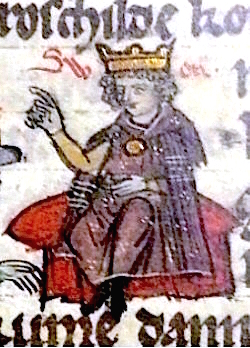
Sweyn III Grathe was the king of Denmark between 1146 and 1157, in shifting alliances with Canute V and his own cousin Valdemar I. In 1157, the three agreed to a tripartition of Denmark. Sweyn attempted to kill his rivals at the peace banquet, and was subsequently defeated by Valdemar I at the Battle of Grathe Heath and killed.

Niels Juel was a Danish admiral and naval hero. He served as supreme command of the Dano-Norwegian Navy during the late 17th century and oversaw development of the Danish-Norwegian Navy.

Jylland is a Danish frigate, and is both a screw-propelled steam frigate and a sailship. It took part in the Battle of Heligoland on 9 May 1864, and is preserved as a museum ship in the small town of Ebeltoft, located on the Djursland peninsula in Denmark.

Jutland is a naval board wargame published by Avalon Hill in 1967 that simulates the Battle of Jutland in the North Sea during World War I. Upon its release, Jutland was commended for its gameplay and mechanics, but criticism surrounded the complex rules and playing time.

Viborg Fodsports Forening, or Viborg F.F. and VFF for short, is a Danish professional football club based in Viborg. The club was founded in 1896 and waited more than a century before winning its only national trophy, the 2000 Danish Cup.
Copenhagen is the capital of Denmark and can refer to the city proper, as well as several geographical and administrative divisions in and around the city:

The Jutland horse is a draft horse breed originating in Denmark, named after the Jutland Peninsula which forms the western part of the country. Usually chestnut, they are a compact, muscular breed known for their calm and willing temperament. The breed was originally developed for use in agriculture, but today is more often seen in urban settings and at horse shows. Some of the best known members of the breed pull beer wagons for the Carlsberg brewery around Copenhagen, as well as at competitions and for demonstrations. Images from the 9th century show a horse similar to the Jutland being used by Viking raiders in what is now Great Britain. The first written record is from the 12th century, when they were popular as war horses. Some infusion of bloodlines from other breeds occurred in the 18th century, but the modern Jutland type only began about 1850 with the addition of blood from several other breeds, mainly draft horses. A stud book was created in the late 19th century, and the Jutland population grew to a maximum around 15,000 by 1950. Numbers subsequently declined, and as of 2011, only an estimated 1,000 horses remained.
HMS Dictator was a 64-gun third-rate ship of the line of the Royal Navy, launched on 6 January 1783 at Limehouse. She was converted into a troopship in 1798, and broken up in 1817.

Jutland is a peninsula of Northern Europe that forms the continental portion of Denmark and part of northern Germany (Schleswig-Holstein). It stretches from the Grenen spit in the north to the confluence of the Elbe and the Sude in the southeast. The historic southern border river of Jutland as a cultural-geographical region, which historically also included Southern Schleswig, is the Eider. The peninsula, on the other hand, also comprises areas south of the Eider: Holstein, the former duchy of Lauenburg, and most of Hamburg and Lübeck.
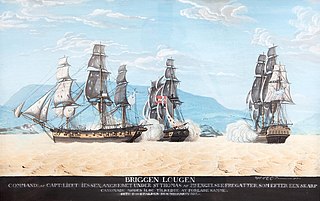
HDMS Lougen was a brig of 18 guns, launched in 1791, and the name-vessel of her class of six brigs designed by the naval architect Ernst Stibolt. She was the first Danish warship to be copper-sheathed. She was active protecting Danish merchant shipping and suppressing pirates in the Mediterranean and in the Caribbean. In March 1801, she fought off the British privateer Experiment and the 22-gun warship HMS Arab in a single action. When the British captured the Danish West Indies in 1801, Lougen was part of the booty. The British later returned her to Denmark where she was broken up in 1802.

Innes McCartney is a British nautical archaeologist and historian. He is a Visiting Fellow at Bournemouth University in the UK.

The Battle of Kolding on January 9, 1644 was the opening engagement of the Torstenson War between the Swedish Empire and Denmark-Norway. The battle was primarily a cavalry engagement between Swedish and Danish cavalry near the Danish seaport of Kolding. The encounter was part of the wider Thirty Years' War, which saw heavy fighting in Central Europe. The Danish army made a defensive stand only to be overrun by the advancing Swedes. It was a decisive victory for the Swedish forces and by the end of January the Jutland peninsula was a Swedish possession.
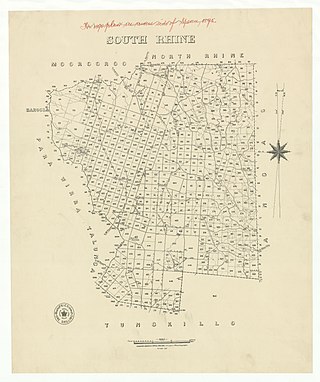
The Hundred of Jutland is a hundred of the County of Sturt in South Australia. It is located on the east Mount Lofty Ranges foothills. The Hundred of South Rhine was proclaimed in 1851 but the name was changed in 1918 to the current, after the Battle of Jutland which took place off the coast of Denmark in 1916. The name change was part of a process to remove "names of enemy origin" at the time of World War I.















